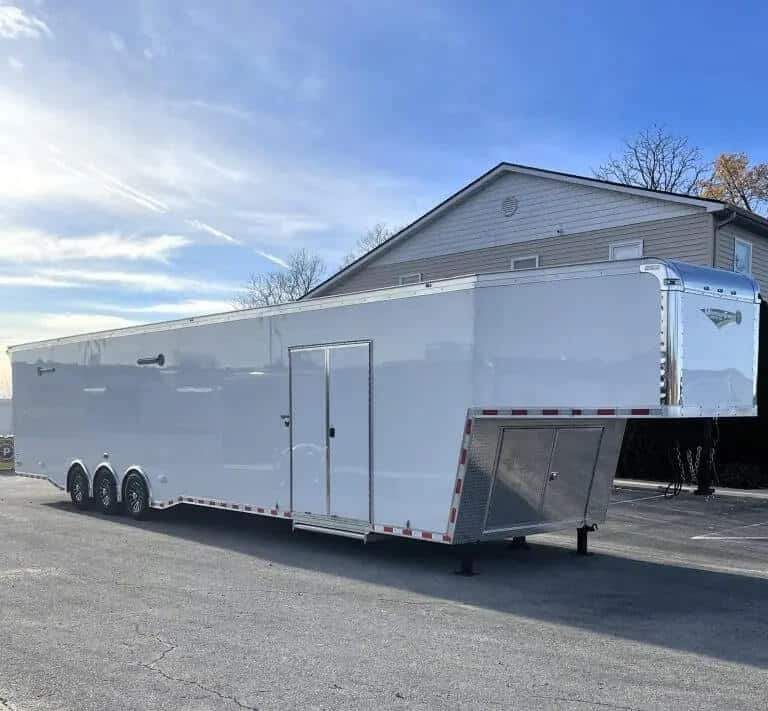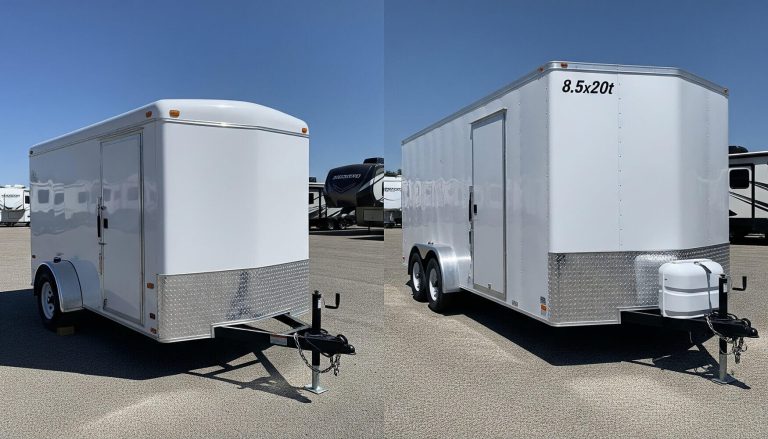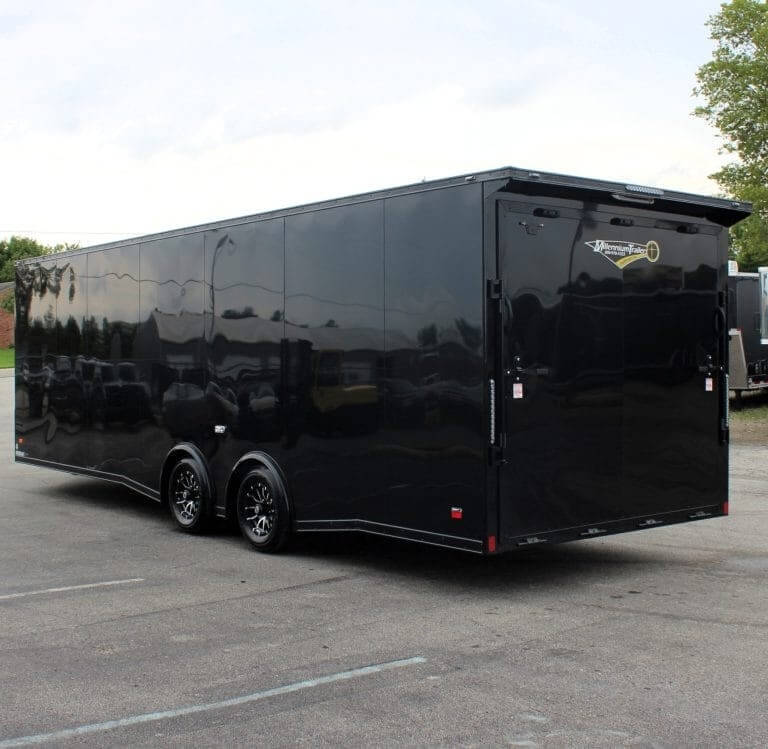There are many different types of trailers on the market, and understanding the differences between them can sometimes seem overwhelming. However, each of these trailers has a unique purpose and benefits,making it ideal for something that the others aren’t as good at.
In this guide, we will discuss in detail the various types of trailers, their characteristics, and their benefits. Let’s get into it.
There are many different types of trailers for hauling, but the dump trailer fills a unique niche within this market.
As the name suggests, these trailers are specifically designed for the transport of cargo loads that can be dumped. For example, these trailers are common in the construction industry where they’re used to transport things like sand, gravel, and building rubble.
Because dump trucks fill such a specific niche but are common for transporting many different load types, there are many different types of dump trailers. To mention just a few of these trailer types, they include the following:
While these trailers offer many benefits, it’s worth noting that the benefits vary depending on the type of dump trailer. Examples include:

As mentioned, the gooseneck style of trailer can cover many other types of trailers in terms of function and purpose. Some of the most common places you’ll see gooseneck trailers may include the following:
When you buy a gooseneck trailer, you’re buying into a whole range of benefits that most trailers don’t offer. Some of these include the following:
Interested in Buying a Gooseneck Car Trailer?
Millennium Trailers is your trusted source for high-quality, durable gooseneck trailers at competitive prices. Visit our website today to browse our inventory and request a quote!

Cargo trailers and enclosed trailers are essentially flatbed or utility trailers that have been enclosed with a roof and walls. As the name suggests, they are used for various types of cargo that require the added protection of a closed trailer.
These trailers are incredibly diverse, which means that you may encounter a whole range of different trailers falling under this name.
As an example, this may include trailers with a single trailer or a double trailer. They may have a gooseneck, pintle hitch, or another hitch type, and they may be used for a wide range of different purposes.
Some examples of different applications for these enclosed and cargo trailers include:
These trailers offer excellent benefits, including the following:

Utility trailers are generally small to medium-sized open trailers which are generally similar to flatbed trailers. In many areas, the two terms are essentially interchangeable. Equipment trailers are also a type of flatbed trailer.
Equipment trailers generally have fenders, a floor that sits between the fenders, and some kind of loading system like a loading ramp or tilting floor to enable easy loading and unloading of tools and equipment.
These trailers offer many benefits, especially to smaller businesses who regularly need to haul heavy equipment. Some examples of these advantages include:
A tilt trailer is a uniquely designed kind of flatbed trailer. As the name suggests, it is capable of tilting the bed to create a ramp.
By turning the trailer bed into a ramp, it makes it easier to load heavy equipment, wheeled machinery, and other cargo that would be difficult to load otherwise.
There are two different types of tilt trailers. One is the sliding or gravity tilt trailer, the other is the hydraulic or pneumatic tilt trailer.
As the name suggests, the sliding tilt trailer is a manual tilt trailer, relying on gravity to turn the trailer bed into a ramp. Generally, this type of trailer has manual options for setting the angle of the trailer bed, to help get the perfect angle for loading the required cargo.
The hydraulic tilt trailer, on the other hand, uses hydraulic mechanisms to lift the ramp into the required position, minimizing workload and giving you greater control over the resulting angle and stability.
This trailer type offers many excellent advantages for those who regularly need to haul heavy, wheeled, or unwieldy cargo. Some of these include the following:
One of the many different trailers is the landscaping trailer. This refers to any kind of trailer used by landscaping companies and generally refers to a type of utility trailer. However, some landscaping companies may prefer to use something like an enclosed, flatbed, or tilt trailer instead.
Depending on the type of trailer that you choose, you may encounter some or all of the following benefits from your landscaping trailer:

As you may have assumed from the name, these trailers have been designed specifically for the transport of cars and automobiles. You may encounter different types of auto trailers, but generally they consist of a ramp and an open or enclosed area for storing a car during transport.
Auto trailers offer many unique benefits to individuals who regularly need to transport cars and other similar types of vehicles Some of these may include the following:
Livestock and horse trailers play an essential part in many agriculture-linked industries, ranging from ranching to horse racing. As the name suggests, these trailers are specifically designed for the transport of horses and livestock.
Livestock trailers come in many different shapes and forms since there’s no universal fit for all kinds of livestock.
Horse trailers, for instance, are almost fully enclosed and much narrower because horses do better when they can’t see too much of what’s going on during transport. It helps them to remain calmer, and reduces the risk of serious injury. Likewise, the absence of bars prevents them from breaking a leg or causing injury.
Cattle trailers, on the other hand, are just as tall as horse trailers but are generally as open as possible and made with bars. That’s because cattle do better when they get good airflow and can see as much as possible. This design helps keep them calm, and they’re not as likely to stick a leg through the bars, so they don’t have the same risks.
Other types of smaller livestock trailers may be intended for the transport of sheep, goats, and other small animals.
The different trailers for transporting livestock offer numerous benefits that simplify the lives of farmers, ranchers, and other livestock enthusiasts. These benefits include the following:
There are many different trailer types, but none are as suited to transporting race cars as the race trailer. With their thick walls, high levels of customization, and ability to keep race vehicles and equipment safe, these trailers are invaluable.
In essence, the race trailer is a type of cargo trailer, specifically designed for the transport of race vehicles. They may or may not have living areas incorporated into the trailer itself.
While you may find many small variations within this group of trailers, like hitch type, axel type, and which material it consists of, there are two main categories within this type of trailer.
The first is the enclosed race trailer. It offers excellent security and protection from the elements. In many cases, it also includes living quarters for members of the race team.
Open trailers are far more affordable, but they don’t offer protection from the elements the way an enclosed trailer does. For this reason, open race trailers are more popular with low-budget enterprises and beginners while enclosed trailers are preferred by professional teams.
Race trailers offer an array of benefits to people in the race industry, including the following:

While you may not consider this a trailer type as such, aluminum trailers offer many unique benefits that deserve mention. Like gooseneck trailers and pintle trailers, this is a very broad category consisting of many different trailers with a shared characteristic.
In terms of types, aluminum trailers are a diverse group, as any kind of trailer can be made of this metal. Some of the types that you may encounter include the following:
In truth, there are few limitations to which trailers can be made of aluminum, making this a large group of trailers.
Aluminum, as a metal, offers many distinct advantages, which is why so many different kinds of trailers consist of it. Some of the benefits include the following:
In addition to aluminum, trailers may consist of a range of other materials, including steel, material composites, and wood or plywood. Each of these materials offer advantages and disadvantages, but steel and aluminum alloys offer the best of both strength and durability.
As you can see, there are innumerable trailer types to choose from. From the reliability of the standard flatbed to the efficiency of a tilt trailer or the specialized abilities of horse trailers or bunk trailers, each of these trailers is unique and useful.
The key is to understand exactly what you need in a trailer and make your purchase accordingly.
If you already know what you want and you’re ready to make a purchase, feel free to browse our inventory of available trailers or contact us to discuss creating a custom trailer.
Our team of experts has years of experience in the industry and can provide valuable insights and recommendations to ensure you make an informed decision that aligns with your needs.
Millennium Trailers is your trusted partner for high-quality trailers at unbeatable prices. Serving all 50 states, we’ve delivered over 5,000 trailers nationwide.
Established in 1998, we’re a company dedicated to meeting your hauling needs with excellence. Whether it’s cargo trailers or custom living quarters, we provide a wide range of options to suit your requirements. Our knowledgeable and friendly team ensures a smooth buying experience with personalized assistance. Proudly offering competitive pricing, state-of-the-art designs, and easy financing options. Committed to customer satisfaction, we strive to simplify the process of finding your perfect trailer.
Choose Millennium Trailers for a reliable, customized solution that delivers quality and value for your investment.
Copyright 1998 – 2023 Millennium Trailers, Inc.